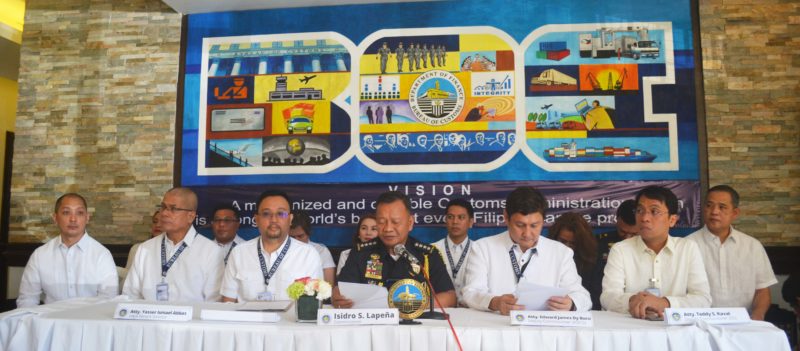

At the back are some of BOC’s district collectors.
The Philippine Bureau of Customs (BOC) is planning to apply for an incentive reward and an exemption from the Salary Standardization Law (SSL), upbeat as it is on surpassing the target revenue in 2018.
Customs Commissioner Isidro Lapeña, in a press briefing on March 5, said BOC is optimistic it will not only achieve its P598-billion revenue target for this year but will also produce a surplus of at least P20 billion. This after the agency breached its goal last February, a historically low revenue month.
BOC collected P43.674 billion last month, exceeding its target of P41.709 billion and posting a surplus of P2.2 billion. This is a first after years of not hitting the target for the month of February. Of the 17 collection districts, 14 hit or even exceeded their goals.
Atty. Edward James Dy Buco, deputy commissioner for Assessment and Operations Coordinating Group, explained that February is considered the most difficult collection month because it is the shortest, is usually a time for company inventories, and coincides with the Chinese New Year celebration when there is a two-week work holiday in China.
“If we have a surplus for the month of February of P2 billion, then [for] the remaining months of the year [it] is not difficult to have surplus,” Lapeña said.
He said his “more optimistic projection” is that if BOC continues to meet its target through December and clears a P2 billion minimum surplus, the bureau will have around P20 billion in surplus in 2018.
If so, Lapeña said, BOC will apply for an incentive reward as provided under the Lateral Attrition Law, which states that an agency can have 20% of its surplus. As an example, he said 20% of P20 billion is P4 billion, which if divided among the 3,000 customs personnel in 2018 (2,700 currently) will amount to P1.4 million for each employee.
Under Republic Act No. 9335, which was issued to improve the revenue performance of BOC and the Bureau of Internal Revenue, a rewards and incentives fund has been created, to be sourced from the collection of both revenue collecting agencies “in excess of their respective revenue targets of the year, as determined by the Development Budget and Coordinating Committee (DBCC).”
Under the law, 15% will be accrued to the fund if the agency has an excess collection of 30% or below; and 15% of the first 30% plus 20% of the remaining excess if there is more than 30% surplus.
In 2006, BOC also hit its revenue target and applied for an incentive reward, which was distributed in 2008. The amount of reward depends on whether attrition applies to the personnel, on the rank of the official and personnel, and on whether the collection district had hit its target or not.
But unlike the 2008 reward, Lapeña said, the planned reward if they succeed this year will be equally divided among all employees, “from the janitor to the commissioner.”
Aside from the incentive, Lapeña said BOC will also apply for an exemption from the SSL if it hits its 2018 target. He noted that when he brought up application for this exemption at a Senate hearing, Senator Richard Gordon advised him that BOC should first strive to reach its revenue target.
The customs chief said that if BOC employees have sufficient salaries to live on, “they can stand [up to] temptation… because they will value their work more.”
Rep. Sharon Garin, at a Lower House committee on ways and means hearing attended by BOC officials last February, noted that Section 202 (i) of the Customs Modernization and Tariff Act actually opens the opportunity for Congress to exempt customs from SSL. Section 202 (i) states that the customs bureau can “conduct a compensation study with the end view of developing and recommending to the President a competitive compensation and remuneration system to attract and retain highly qualified personnel, while ensuring that the Bureau remains financially sound and sustainable.”
Meanwhile, asked about the three district collectors whose ports fell short of their February targets, Lapeña said he will recommend their removal “as agreed during the collectors’ meeting” last January. He noted that the basis for the distribution of target for each collection district was set so that the target is “very reasonable and [is] based on the commodities and volume that [are] arriving in their respective ports.”
Lapeña earlier said district collectors, deputy collectors for assessment, chiefs of the Formal Entry Division, and examiners must hit their revenue targets so they can stay in their posts. – Text and photo by Roumina Pablo




